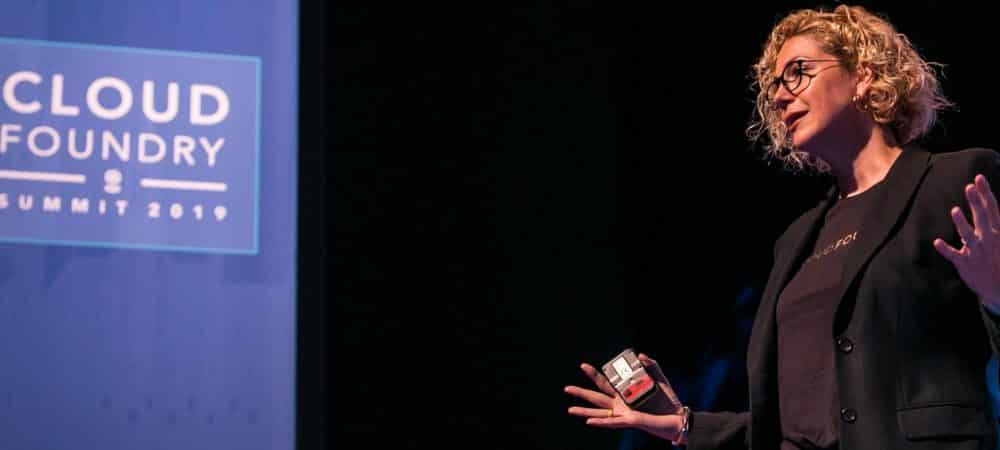“Infrastructure should be boring,” said Craig McLuckie, Vice President of R&D at VMware, during the first keynote of the Cloud Foundry Summit 2019 in The Hague, Netherlands. And with that, the topic of many conversations, panels and discussions was born. The general idea is that developers should not have to worry about taking care of infrastructure anymore because a solution will do that for them. Cloud Foundry wants to be that solution.
Rapid stream of transformation
However, before that can happen, companies have to adapt to a new digital world. “Real transformation is not about adopting a shiny new technology, it’s about adapting to a rapid stream of advances and innovation,” explained Abby Kearns, Executive Director of the Cloud Foundry Foundation (Picture). “We’re already on this rapid stream of transformation and there’s no getting out of this boat. So we can only learn to navigate the stream.”
To do that, companies need developers more than ever before. Improving developer experience is therefore equally important as improving customer experience. “We have reinvented infrastructure. But there is a hunger that we keep coming back to: how do we make the developers themselves faster?”, asked Chip Childers, CTO of the Cloud Foundry Foundation, during his keynote on Day 2 of the Summit.
He himself had already given the answer during a press conference the day earlier, “Modern practices and modern platforms significantly speed up development. A team of eight can do more with modern practices than a team of a thousand people with old ones.”
Community is everything
The executives of the Cloud Foundry Foundation in attendance were very vocal about the need to drastically improve the developer experience. They advocated for cleaner code, more inclusivity, and more accessibility, because digital transformation hinges on developers.
As open source multi-cloud application, collaboration and contributions are essential to further develop the Cloud Foundry platform. The vibrant community at the Summit highlighted how passionately developers are engaging with the platform and open source in general. To keep up this diversity and creativity, a big talking point was equality and inequality in the tech community. The Cloud Foundry Foundation gave a voice to many underrepresented minorities within the tech community to raise awareness of issues people face today because of racism, sexism or other forms of discrimination.
Kubernetes and Cloud Foundry
Regarding technology, Kubernetes was the topic of the day. With Eirini and Quarks gaining traction, many people asked if maybe Kubernetes may replace core functions of the Cloud Foundry platform one day.
Asked if he thinks that Eirini and Quarks will one day replace Diego and Bosh, Chip Childers responded, “Yes. Eirini has a clear path to conversion and migration, but not everyone can use it yet. And in the spirit of open source, we leave nobody behind. So yes, this is definitely coming, but there is no conversion yet.”
At the end of the Summit, the core message was quite clear: Cloud Foundry benefits developers and business. Developers, because without having to dedicate most of their time to manage the existing infrastructure, they are free to develop new solutions; and business, because developers having more time to be creative means more revenue through new innovations.
“Digital transformation is not a destination,” said Abby Kearns to highlight how important a platform that continuously manages infrastructure is. “There is no going back to how things were. Companies need to transform, even if their stock price and their revenue don’t look like it. I mean, look at Blockbuster: they were doing amazing – until they weren’t.”





















Add Comment